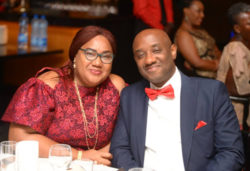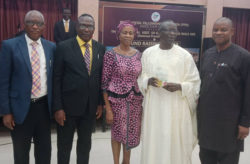A review of our political history will show a gradual erosion of reasoning and intellectual discourse in our political dialogue, leading to a decline in our practice of politics.
The debates and well-reasoned papers, in the beginning, have given way to insults and violence in word and act. The present security drift of our nation is the climax of this development.
A Re-think is absolutely imperative. We must re-educate, re-value, and provide guidance for the younger generations if we are to avert what is on the horizon.
We, in YIGBA, are firmly persuaded that the erection of a “Non-Violent Line of Defence” is our most effective strategy in reversing the tidal wave of negativity towering over the country. We invite you to join hands with us in this initiative.
NON-VIOLENT COMMUNICATION:
The best way to revisit and deal effectively with our stormy past and resolve the issues dividing us, is to inject Non-Violent Communication (“NVC”) into our national narrative.
NVC is a most effective tool whereby Nigeria’s ethnic and other interest groups, without necessarily changing their core identity or values, can work together in harmony to strengthen their common ideals and project their common interests, thus fostering the peace and progress of the nation of Nigeria.
NVC is an essential building block in reconstructing a new Nigeria where all tribal interests are well represented and respected. It revisits the truth of the words of our former national anthem, viz:
“Though tribe and tongue may differ,
in brotherhood we stand,
Nigerians, All and proud to serve
our sovereign motherland.”
NVC is a foundation strategy of the YIGBA culture. NVC has been used successfully and effectively in many conflict zones across the globe. In the Western world advocates of NVC, such as Ken Cloke and Marshall Rosenberg, have recorded great successes.
The tremendous achievements of Martin Luther King Jr. and Mahatma Gandhi were due largely, if not entirely, to their unwavering commitment to NVC in their political strategy and advocacy.
Non-Violent Communication is the integration of 4 things:
- Consciousness
A set of principles that support living a life of compassion, collaboration, courage, and authenticity.
- Language
Understanding how words contribute to connection or distance.
- Communication
Knowing how to ask for what you want, how to hear others even in disagreement, and how to move forward towards solutions that work for all.
- Means of influence
Sharing “power with others” rather than using “power over others”.
The application of NVC, de-emphasizes self-interest, at least the priority of it, and makes us more inclined to share resources to everybody’s benefit, with equity.
The primary aim of NVC is the peaceful resolution of conflicts, in which everybody’s needs are met, whilst eschewing inequality, poverty, violence, war, and ecological destruction.
It focuses on identifying needs devoid of labels. Once the needs are identified, you can collaboratively craft strategies that satisfy all the needs, or as many as possible.
Areas of NVC application include:
- communication in political campaigns, ads, and rallies;
- communication within and among government departments; and
- communication from the government to the general public.
The above, properly applied, engenders trust and this itself becomes a basis for patriotism and loyalty to the flag. Success in the Southwest is not because of the wisdom of the leaders’ speeches but the evident benefits enjoyed of health, education and housing enjoyed. Same, admittedly though to varying extents, in all the regions.
The absence of trust diminishes the potential for more people to get involved in governance and politics, which in turn heightens the sense that those in political power are disconnected from everyday people.
Therefore, transparency in government — and getting everyday citizens involved in governance — is important to restore faith and confidence in our governing bodies and systems.
 NVC helps to transform political culture where politicians and leaders take the needs of others into account, not only their own needs.
NVC helps to transform political culture where politicians and leaders take the needs of others into account, not only their own needs.
This approach leads to a more equitable distribution of resources, beyond political party differences. Not that you agree but that you understand.
In conclusion, it is pertinent to observe that NVC actually resonates with the common ancient African culture of discourses in the courts of kings and the elders.
Conversations and dialogue were replete with ancient proverbs and anecdotes which allowed the listener to self-adjudge, without having to endure the stigma of direct indictments. And this, because proverbs have the reference basis to speak beyond the sentence; they are, thus, able to provide feelings, thoughts, or actions of both speakers and listeners in a safe, non-threatening way.
African proverbs convey wisdom, truth, discovery of ideas, as well as life lessons and several non-aggressive functions. Our ancients thus used them to deal with difficult communications and situations, enabling them to do so without ruffling feathers or otherwise troubling the waters.
Call the use of proverbs, if you like, politeness or peace-maintaining strategy. Thus, they served as effective guardrails in inter-tribal, inter-personal, and other relationship protocols.
YIGBA aims to borrow from and build upon this ancient African wisdom in advocating for and promoting Non-Violent Communication.
Thus, YIGBA is essentially clawing back to drink from the wells of ancient African wisdom and translating the same to address the expediencies of our modern society.









